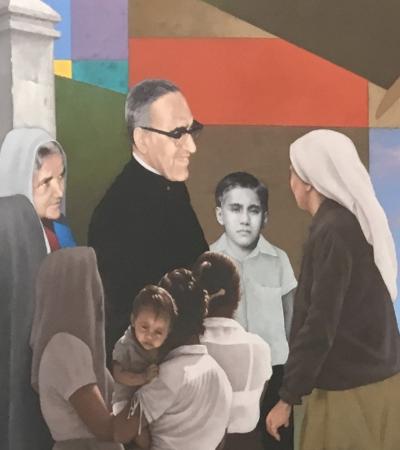Romero and Catholic Social Teaching: Romero and Peace (VIRTUAL)

"The Poetry of the Peacemaker: Saint Oscar Romero and the Catholic Vision of Peace" by Rev. Kevin Burke, SJ, Vice-President for University Mission and Professor of Theology, Regis University
This chapter examines the contributions of St. Oscar Romero to Catholic social teaching on violence and peace. I attend to his reflections on these themes as he developed them in his Third Pastoral Letter (with Bishop Arturo Rivera y Damas), “The Church and the Popular Political Organizations” (1978), and his Fourth Pastoral Letter, “The Church’s Mission Amid the National Crisis” (1979). I also refer to his famous Louvain address, “The Political Dimension of the Faith from the Perspective of the Option for the Poor” (1980) and his text for an address he was not able to give, “Pastoral Message to the National Council of Churches” (1979). As I examine St. Romero’s clear summary of Catholic teaching on violence and peace, I will also draw upon essays I’ve published. I will look to two other primary sources – the homilies and prophetic actions of St. Romero – to show that his “Catholic vision” is not exhausted in the clear and careful language of social ethical argument; it also lives in the beauty and passion of his ministry and his life. Finally, I will draw comparisons between the witness St. Romero and that of the British-born American poet and social activist, Denise Levertov to reflect on the poetic quality of St. Romero’s witness to peace and peacemaking. (Click here for the full abstract and outline.)
"El Salvador’s Search for Meaning: Romero’s Peacebuilding Legacy Explored in the Post-War Era" by Jose Henriquez, Salvadoran Peace Activist; Doctoral Researcher and Lecturer, Irish Centre for Human Rights, National University of Ireland
At the end of the 1970s in a context of brutal state repression and at the brink of a civil war, Monseñor Romero became a prophet of peace, whose witness embodied a fearless pursuit of justice and an unambiguous commitment to Gospel nonviolence. This essay examines Romero’s commitment to nonviolence by looking closely at a particular aspect of his ministry: The development of a critical and artful dialogical practice, which allowed him to become one of the most credible actors amidst the contentious political environment in which the country was immersed. Dialogue and mediation are scarcely considered when nonviolent approaches are studied; however, they have an enormous potential for peacemaking. Romero’s dialogue skills were built on an extremely refined listening capacity marked by faithful attention to the signs of the times, his interaction with multiple actors along the Salvadoran political and religious spectrum, and, above all, his proximity to the suffering people who were at the very heart of his pastoral mission. That dialogical capacity was never seen before in the history of the Salvadoran hierarchy. While it certainly reflects his personal sensitivity, this aspect of his legacy as a peacemaker also sheds light on his deep experience of Gospel values and on his adherence to the Catholic Social Teaching tradition.
Participation is limited to a small number of faculty and graduate students. Please register to be considered for participation. Preparation materials will be sent to confirmed participants prior to the session.





